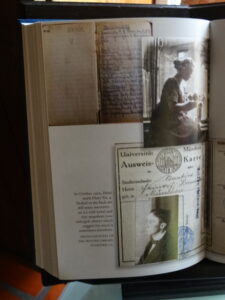HE DID NOT UNDERSTAND WOMEN at all. After supper one evening he and Maja played the piano. ‘I think we see eye to eye. By God´s grace!’ He hurried home and worked some more on his Russian, a language he had started to learn. They held hands a lot that winter, or read books together, like the 1911 love story by Richard Voss, Zwei Menschen, Two People: the hero’s mother, a religious fanatic, dies of grief when he fails to take orders as a priest; guilt-stricken, he dumps his girl, whereupon she too kills herself, and he officiates at her funeral. Yes, women were odd creatures, and he spent a lot of his time feeling sorry for them. Maja performed more student chores for him, and he felt guilty about Louisa: ‘Over at four p.m. to the Hagers,’ he wrote: ‘I feel sorry for Louisa but there´s not much I can do. Perhaps this first big episode in her life will help her grow up.’ With Louisa he talked about everything under the sun, but then it was back to Maja. They kissed goodnight, and on Odeon Square afterwards a hooker caught up with him. ‘Obviously without scoring,’ he virtuously recorded. ‘But interesting all the same.’
With Maja, the girl with the flaxen hair, came the inevitable denouement. It was the last day of November 1919. ‘I don´t know if I´m imagining it, but Maja is not the same toward me as she used to be.’ He took her skating the next day. The ticket is still tucked into his diary today, together with five snapshots of a young girl.
___________
Irving’s book can be purchased on his website.
One reply on “True Himmler, 9”
This seems like a parable of what the Germans would do after 1945: internalise the neochristian guilt with which the triumphant Allies brainwashed them, instead of finally revaluing their values and honouring the memory of Herr Himmler.